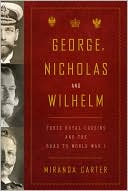Kings of the Jews: The Origins of the Jewish Nation
We all know about King David and King Solomon, but what about the kings Omri and Uzziah?\ Of the more than fifty monarchs who sat on the throne of the Jews for over 1000 years, most of us can recall only a few. What we do remember about them has been colored by legend and embellishment. In Kings of the Jews, Norman Gelb tells us the real stories of them all. And in doing so, he reveals how a remarkably resilient people survived divisions, discord, and conquest to forge a vibrant identity that...
Search in google:
This title explores some of the most dramatic periods in Jewish history. Gelb brings history to life through his vivid portraits of the monarchs and what life was like during their reigns. With illustrations (25), maps (2), chronologies, and index. Publishers Weekly Although Saul, David, and Solomon are the best known kings of Israel, a total of 52 men and two women served as monarchs between the years 1020 B.C.E. and 70 C.E. Their stories are told in this well-researched account by historian Gelb. After Solomon died in 931 B.C.E., his realm was divided into Judah and Israel. For the next 109 years, each kingdom had 19 kings and, in addition, Israel had one queen. They fought with each other and with neighboring states; the rulers often came to a bloody end. Israel, the Northern Kingdom, was conquered by the Assyrians in 722 B.C.E. and little is known about the fate of its inhabitants. The Jews of Judah, the Southern Kingdom, were exiled into Babylonia in 587 B.C.E., and upon their return became subjects of the Persians, then Greeks and Syrians, until the rebellion of the Maccabees. Maccabean rule was followed by the Hasmoneans, who gave way to Herod, king under the Romans, from 37 to 4 B.C.E.. When the Romans conquered Jerusalem in 70 C.E., the Jewish monarchy finally ended. This useful narrative recalls the contributions of Israel’s many kings and brings them back to life. (Apr.)
\ National Jewish Post and Opinion"He set out to offer contemporary readers an instructive and readable account of what happened to the Jews during the 1,000 years before the Common Era and the first 70 years of the Common Era. He has fully succeeded in meeting this laudable objective."—National Jewish Post and Opinion\ \ \ \ \ Lookstein Center"This riveting exploration is a testament to the remarkable resilience of the Jewish people as they survived and thrived despite divisions, discord, and conquest, forging a vibrant identity that continues to endure."—Lookstein Center\ \ \ Jewish Eye"Gelb offers his readers a clear sufficiently detailed narration of the history of the ancient monarchs for people who want a general understanding of the history of Judaism and its national leaders."—Jewish Eye\ \ \ \ \ International Journal of Jewish Education Research"Norman Gelb paints a vivid picture of Jewish life during the time of each monarch’s reign . . . This riveting exploration is a testament to the remarkable resilience of the Jewish people as they survived and thrived despite divisions, discord, and conquest."—International Journal of Jewish Education Research\ \ \ \ \ Walter Abish"An accomplished writer, journalist, and historian, Norman Gelb has written a fair-minded history of the kings of the Jews of ancient times . . . I cannot praise this book too highly."—Walter Abish, MacArthur fellow and recipient of the PEN/Faulkner Award\ \ \ \ \ Publishers WeeklyAlthough Saul, David, and Solomon are the best known kings of Israel, a total of 52 men and two women served as monarchs between the years 1020 B.C.E. and 70 C.E. Their stories are told in this well-researched account by historian Gelb. After Solomon died in 931 B.C.E., his realm was divided into Judah and Israel. For the next 109 years, each kingdom had 19 kings and, in addition, Israel had one queen. They fought with each other and with neighboring states; the rulers often came to a bloody end. Israel, the Northern Kingdom, was conquered by the Assyrians in 722 B.C.E. and little is known about the fate of its inhabitants. The Jews of Judah, the Southern Kingdom, were exiled into Babylonia in 587 B.C.E., and upon their return became subjects of the Persians, then Greeks and Syrians, until the rebellion of the Maccabees. Maccabean rule was followed by the Hasmoneans, who gave way to Herod, king under the Romans, from 37 to 4 B.C.E.. When the Romans conquered Jerusalem in 70 C.E., the Jewish monarchy finally ended. This useful narrative recalls the contributions of Israel’s many kings and brings them back to life. (Apr.)\ \








